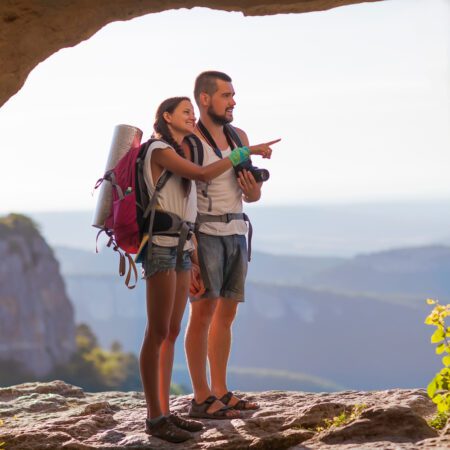 This article looks at the fitness, mental, and health benefits of hiking.
This article looks at the fitness, mental, and health benefits of hiking.
It also discusses the disadvantages of hiking and contains generalized tips for beginners, hiking safety tips, and suggestions on the gear you will need to get the most from the activity.
If you want to improve your fitness and health and boost your mental clarity while enjoying the outdoors, try hiking!
I recently got into it by accident due to taking up stand-up paddle boarding.
Being new to SUP, I wanted to find an uncrowded place to practice.
My partner said he knew of some suitable waterways slightly off the beaten track, warning me that getting to them would involve short hikes.
This sounded better to me than the thought of constantly falling into the water in front of strangers, so I asked him to take me, not expecting to like the trek. I couldn’t have been more wrong about that.
Since then, we’ve been hiking every Sunday. Nothing long or overly challenging yet, but I enjoy it enough to know I want to keep doing it and that I wanted to research the benefits of hiking and write this article.
In a nutshell, I learned that hiking offers a wide range of physical, mental, and emotional benefits and is an ideal way to stay physically active while experiencing nature’s beauty.
It can improve fitness, cardio health, and balance, help you lose weight, strengthen bones and muscles, reduce stress, and enhance mental well-being.
Keep reading to discover more about the benefits of hiking.
Who does hiking suit?
Hiking is an activity enjoyed by people of all ages and fitness levels.
Newbies can do short hikes on flat pathways, progressing to longer, more challenging hikes as their stamina and fitness improve.
Table of Contents
Fitness Benefits of Hiking
The fitness benefits of hiking are numerous.
Providing a form of aerobic exercise that improves overall fitness and muscular strength, as you hike, you will breathe deeper and faster, increasing your lung capacity and endurance.
When hiking, your body has to work harder than when walking along a paved sidewalk or flat road.
The uneven terrain uses more energy as your core and legs constantly adjust to maintain balance. This leads to improved agility and coordination.
Hiking burns calories in the region of 450 to 600 calories per hour. Done regularly, this will result in weight loss over time, provided you don’t eat more.
The inclines found on many hiking trails require more effort from your legs’ major muscles, strengthening your legs and glutes.
To enable them to take snacks and water, most people carry a backpack when hiking. Doing so will burn extra calories and strengthen your chest, back, and shoulders.
Along with its many fitness benefits, hiking has some valuable mental health benefits, which we look at next.
Mental Health Benefits of Hiking
Hiking is not only an excellent form of physical exercise, it also promotes mental well-being and clarity, with numerous studies finding that it can reduce  stress and anxiety, improve cognitive functioning, and foster personal growth.
stress and anxiety, improve cognitive functioning, and foster personal growth.
Physical activity, including hiking, decreases stress hormones and releases feel-good brain chemicals such as dopamine and serotonin, leading to improved mental outlooks in facing the daily stresses life can bring.
Spending time in nature has also been associated with increased positive moods and decreased psychological distress, so it’s a win/win situation.
Taking your cell phone will help keep you safer, but turn it off. Hiking away from digital distractions will enable you to temporarily leave behind your obligations so you can relax in a peaceful atmosphere where nothing needs immediate attention.
Research also indicates it can aid in creative problem-solving.
During a hike, people may travel alone without external noise or interruptions, allowing for personal reflection.
Immersing oneself in nature’s peace and serenity can increase mental clarity, assisting decision-making.
Hiking also offers a great way to bond with friends or family because it encourages uninterrupted conversations with companions that aren’t always possible at home or work, given the constant distractions in those settings.
In addition to the mental health benefits above, regular hikes can cultivate resilience through overcoming challenging experiences, thus fostering confidence and personal growth.
Hiking can also boost energy levels and improve sleep quality.
Next, we look at the health benefits of hiking.
General Health Benefits of Hiking
Besides its physical and mental health benefits, hiking has valuable general health benefits.
Regular exercise can positively impact our health, reducing the risks of heart disease, type 2 diabetes, and even some types of cancer.
It can also lower high blood pressure, lessening the likelihood of a stroke attack.
Along with its aerobic benefits, hiking strengthens muscles, and falls are less likely to occur with stronger muscles. This benefit is of particular relevance for seniors and anyone with stability issues.
Consider turning your hike into a weight-bearing exercise by wearing light wrist and ankle weights or carrying a weighted backpack to increase the benefits. This can further help to improve bone density.
Traversing inclines and uneven terrain activates and ultimately strengthens the core muscles. A strong core can mitigate or prevent lower back pain and improve mobility and functional fitness.
As referenced above, hiking burns an average of 450 to 600 calories an hour, facilitating weight loss or maintenance, with heavier individuals burning more calories than lighter ones.
The rougher the terrain and the more effort expended results in a higher calorie burn, so you will lower your body fat faster, including visceral fat.
Visceral fat is abdominal fat located near vital organs, including the liver, intestines, and stomach. It can also be found in the arteries.
Reducing it lowers the risk of heart disease, prediabetes, and diabetes.
Vitamin D is essential for good health and keeping bones strong. It also helps fight infection and keeps our muscles, brain, heart, and lungs healthy.
Be sure to wear sunscreen to protect your skin from cancer and premature aging.
Next, we will look at the disadvantages of hiking.
Disadvantages of Hiking
There are a few disadvantages of hiking, most of which can be avoided by using common sense.
Don’t venture into areas that could be dangerous. This includes cliffs you could fall over and overgrown forests in which you could become lost.
You could also fall and sustain a sprain or break if the terrain is rough or your shoes don’t have good tread.
Leave challenging trails for later when you have more hiking experience, and wear the correct footwear.
Depending on where you live, there could be wild animals and/or poisonous snakes and spiders, so be aware of your surroundings at all times.
Video outlining the physical, mental, & health benefits of hiking
Tips for Beginner Hikers
Following are a few tips for beginner hikers to help ensure safe, enjoyable outings.
Wear comfortable gear –
Make sure your clothes, shoes, and backpack fit comfortably.
Consider long pants to protect yourself from the elements and bug bites, and wear hiking boots or trail shoes with good treads to help prevent slips and falls.
Pack Necessary Supplies –
Take a charged cell phone, first aid kit, snacks, and lots of water – at least one gallon per person – to stay hydrated during your hike. 
Utilize the map or GPS app on your phone to locate your geographical position in relation to landmarks so that you know where you are at all times while on the trail.
Other helpful items include bug spray, sunscreen, and a whistle to attract attention if you become lost or injured on the trail.
Know Your Physical Limitations –
Start with shorter and easier hikes until you are fitter and more accustomed to navigating, using a map, packing supplies, etc. You can work your way up in difficulty levels as you become more experienced and comfortable with hiking.
Be Prepared for Any Weather Conditions –
Be aware of weather changes as the temperature can drastically change very quickly when out on the trail, leading to hypothermia in cold climates or heat stroke in hot ones.
In either case, always be prepared for possible changes throughout your hike by bringing seasonally appropriate clothing layers.
Check for flash flood warnings before going out – flooding can create hazardous situations on trails.
Clothing layers are practical when the weather shifts from warm to cold or vice versa during a hike.
Next, we look at some hiking safety tips.
Hiking Safety Tips
Hiking can provide multiple physical and mental benefits if done safely.
But as with any physical activity, it’s important not to get too far out of your comfort zone, take breaks as needed, and stay hydrated.
Here are some safety measures to keep in mind before you hit the trails:
Plan your route –
Make sure you plan your route ahead of time and have an idea of the terrain.
Let a friend or family member someone know when and where you’ll be hiking and the approximate time you’ll return.
Arrange to call them when you’re back in civilization, asking them to phone if they don’t hear from you. They can alert the appropriate authority to send a search party to look for you if they can’t contact you.
Wear proper footwear –
Appropriate shoes improve your comfort and stability on uneven terrain and provide ankle support and traction.
I bought a pair of KKYC Women’s Hiking Boots, and I love them. They’re water-resistant, comfortable, supportive, and have excellent tread, so I’ve had no trouble with my feet slipping.
The boots are perfect for hiking and cool enough to wear with jeans for casual outings. They come in a broad range of colors – mine are light beige – so I will probably get a second pair.
Stay hydrated –
Take ample water and snacks such as trail mix, bananas, or energy bars for long hikes. You always want to stay hydrated and energized on the trail!
Wear bright colors –
Wear brightly colored clothing so you’re more visible in low-light conditions.
Prep for any weather changes –
Before heading out, it is critical to check the current weather conditions and short-term forecast and plan accordingly.
Regardless of the forecast, it’s a good idea to take a light T-shirt, a sweater, and a rain jacket or water-resistant clothing in case the weather changes unexpectedly.
Take essential tools –
Pack a first aid kit, a flashlight with extra batteries, and a basic multitool with a knife blade and pliers, which can come in handy in various situations while on the trail.
Hiking Clothing and Gear
When it comes to gear and clothing for hiking, proper preparation is vital to a safe and enjoyable experience. Investing in quality outdoor gear can make hiking more enjoyable by ensuring you stay safe, warm, and dry while on the trails!
The best hiking clothing choice depends on the season, terrain, and any other outdoor activities you may have planned; however, some items are essential for all hikes.
A good pair of comfortable walking shoes or boots with a good grip will protect your feet from harsh terrain and rocks, provide arch support, prevent blisters, and keep you stable in muddy or wet areas.
Make sure your shoes or boots fit well, and pull the laces firmly. Well-fitting shoes will make it easier to walk and move through rough terrain.
Hiking socks should be made of breathable materials to keep your feet dry and comfortable while trekking.
Pants worn over light long johns are an excellent option for added warmth in cooler climates.
Shorts can work well in warmer temperatures, depending on how long your hike will be.
Other important clothing items include:
- A sun hat with a wide brim
- Polarized sunglasses to improve visibility on sunny day and help protect your eyes from overhanging branches
- An inner or outer layer according to the temperature outside (like a light windbreaker for windy days)
In addition to the proper attire, it’s essential not to forget about packing additional items like:
- A fully charged cell phone
- Sunscreen to protect from sunburn
- Bug spray to repel pesky flying and crawling insects
- Checklists for snacks/emergency supplies such as water/matches/a first-aid kit
- Extra layers like gloves and beanies for cold weather hikes
Investing in quality outdoor gear can make hiking more enjoyable by making sure that you stay safe, warm, and dry while out on the trails!
Final Thoughts on the Benefits of Hiking
Hiking provides many benefits for both general, physical, and mental health. 
It helps to improve cardiovascular health and endurance and strengthens bones and muscles.
It promotes weight loss for those who are overweight and assists with weight maintenance for those who don’t need to shed any pounds.
Hiking can improve mood, enhance creativity, and increase focus and mental clarity.
Additionally, long-term exposure to nature has proven to alleviate depression symptoms while providing better sleep quality and improved mental clarity.
It can provide an escape from daily stressors as it allows you to be surrounded by nature, which aids in relieving anxiety, calms the mind, and even provides personal empowerment.
Equally important is the sense of accomplishment that comes with completing hikes, no matter the difficulty. This provides a sense of self-confidence and pride in oneself for achieving personal goals.
And you can experience all of these benefits while exploring the great outdoors.
So what are you waiting for? Grab your hiking gear and head out the door – it’s time to hit that trail!

